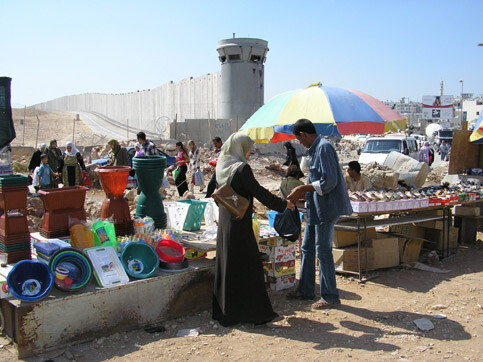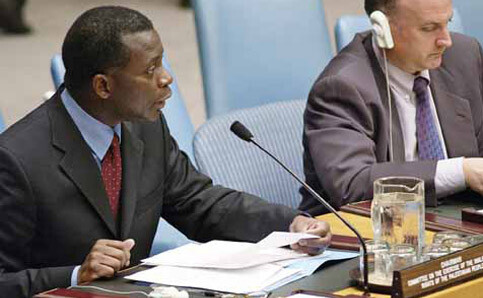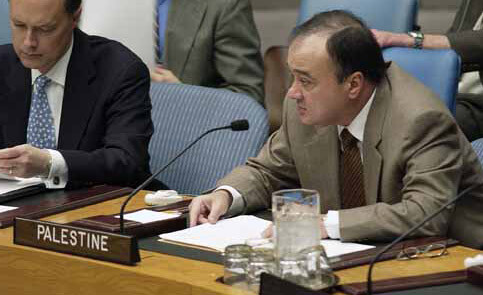United Nations News Service 6 August 2004

The wall at Kalandia checkpoint separating Ramallah and Kalandia refugee camp from ar-Ram and northern Jerusalem neighborhoods and Palestinian villages (Arjan El Fassed)
PALESTINE’S OBSERVER STRESSES OPINION’S IMPORTANCE, BUT SAYS SITUATION ON GROUND HAS FURTHER DETERIORATED
Developments since the International Court of Justice issued its advisory opinion on Israel’s construction of a wall in the occupied Palestinian territory and the General Assembly meeting that followed were less than promising, Palestine’s Observer Nasser Al-Kidwa told the Committee on the Exercise of the Inalienable Rights of the Palestinian People this morning.
On 9 July, the International Court of Justice issued its advisory opinion on the construction of the wall, declaring that the wall and its associated regime were in breach of international human rights and humanitarian law, as well as the right to self-determination. It stipulated that Israel was under an obligation to cease construction of the wall, dismantle the structure and make reparation for all damage caused by that project.
On 20 July, the tenth emergency special session of the Assembly adopted resolution A/ES-10/15, by a vote of 150 in favour to 6 against, with 10 abstentions, by which it demanded that Israel comply with the legal obligations as identified in the advisory opinion.
Mr. Al-Kidwa stressed that the opinion was, indeed, the most important development in the United Nations system since the partition plan, and the resolution adopted could be the most important resolution since the same plan. After all of that, the international community awaited compliance by the occupying Power.
However, soon after those events, Israeli officials rejected the opinion; spoke with disdain for the Court, its opinion and the Assembly; and stated its intention to continue its construction of the wall. That left the international community to consider what further measures should be taken to end the unlawful situation resulting from the wall’s construction.
The above developments had taken place while the situation on the ground had further deteriorated, he said. The occupying Power continued to kill and injure Palestinian civilians, destroy homes and property, confiscate land, continue building of the wall and illegal settlements, and cause further deterioration of the already dire economic situation of the Palestinian people.
At the outset of the meeting, Committee Chairman Paul Badji (Senegal) briefed delegations on events since the Committee’s last meeting. He also presented a report on the United Nations African Meeting in Support of the Inalienable Rights of the Palestinian People, 29 and 30 June, and the United Nations Forum of Civil Society in Support of Middle East Peace, 1 July, in Cape Town, South Africa.
In addition, he reported on the thirty-first session of the Islamic Conference of Foreign Ministers, held in Istanbul from 14 to 16 June, and on the fifth ordinary session of the Executive Council and the third ordinary session of the Assembly of the African Union, held in Addis Ababa from 30 June to 3 July.
Also today, the Committee approved the provisional programme for the United Nations International Conference of Civil Society in Support of the Palestinian People, which will be held at Headquarters from 13 to 14 September. It also approved the application of the non-governmental organization People’s Alliance for Peace Malaysia (Malaysians for Peace) for accreditation to the Committee.
The representatives of South Africa and Mali also addressed the Committee.
Statements
Briefing the Committee about events since its last meeting, Committee Chairman PAUL BADJI (Senegal) said that on 9 July, the International Court of Justice issued its advisory opinion on the legal consequences of the construction of the wall in the occupied Palestinian territory, including in and around East Jerusalem. The Court clearly pronounced itself, declaring that the wall and its associated regime were in breach of international human rights and humanitarian law, as well as the right to self-determination. It stipulated that Israel was under an obligation to cease construction of the wall, dismantle the structure and make reparation for all damage caused by that project.

Paul Badji (left), Chair of the Committee on the Exercise of the Inalienable Rights of the Palestinian People (UN Photo/Evan Schneider)
On 16 July, he continued, the General Assembly resumed the tenth emergency special session to consider the advisory opinion. On 20 July, the Assembly adopted resolution A/ES-10/15 by an overwhelming majority of 150 in favour to 6 against, with 10 abstentions. In it, the Assembly acknowledged the advisory opinion and demanded that Israel comply with the legal obligations as identified in the opinion. It also requested the Secretary-General to establish a register of damage caused to all the natural and legal persons concerned, as stipulated in the opinion.
The resolution further called on all States parties to the Fourth Geneva Convention to ensure compliance by Israel of the Convention, and invited Switzerland, as depository of the Geneva Conventions, to conduct consultations and to report to the Assembly on the possibility of resuming the Conference of the High Contracting Parties to the Fourth Geneva Convention.
NASSER AL-KIDWA, Observer for Palestine, said that the Court had rendered on 9 July a historic legal opinion on the construction of the wall on occupied Palestinian territory, stating that the wall and its associated regime were contrary to international law. It found that Israel’s construction was in breach of several of its obligations under the Charter, the Fourth Geneva Convention and other relevant international human rights law. In accordance with its finding, the Court concluded that Israel was under obligation to terminate its breaches and to cease construction of the wall, to dismantle segments already built and render ineffective all legislation relating thereto. Further, Israel was under obligation to make reparation for all damage caused by the wall.

Nasser Al-Kidwa (right), Permanent Observer of the Permanent Observer Mission of Palestine (UN Photo/Evan Schneider)
The Assembly, at its tenth emergency session, adopted a very important resolution, in which it demanded that Israel comply with its legal obligations as mentioned in the advisory opinion and called on all Member States to comply with their legal obligations. The opinion was, indeed, the most important development in the United Nations system since the partition plan, and the resolution adopted could be the most important resolution since the same plan.
After all of that, the international community awaited compliance by the occupying Power. However, developments in that regard had been less than promising. Soon after those events, Israeli officials rejected the opinion and spoke with disdain for the Court, its opinion and the Assembly, and stated its intention to continue its construction of the wall. That left the international community to consider what further measures should be taken to end the unlawful situation resulting from the wall’s construction.
Further measures should be taken, at least at three levels, he stated. First, at the level of the United Nations system, at some point it would be necessary to go to the Security Council with a draft resolution to deal with the non-compliance of Israel. Doing so, however, should not prevent keeping open the option of returning to the Assembly. Also, the Secretariat and the Secretary-General should expedite the work requested from them in the Assembly’s recent resolution. In addition, they both should make sure that all positions and documents issued by the Secretariat were congruent with the advisory opinion.
At the second level, dealing with Member States, actions at the international, regional and national levels should be taken against the products of the illegal settlements, and against companies and entities involved in the wall’s construction. Third, he hoped the Swiss Government would expedite the consultation and propose concrete measures to ensure compliance with the Fourth Geneva Convention. He would call on the Non-Aligned Movement, at its upcoming summit in Durban, to support that agenda. He hoped the Movement would find it possible to lend its support to such proposals.
Those developments had taken place while the situation on the ground was further deteriorating, he said. Not a single day had gone by during which the occupying Power had not engaged in the deliberate violation of international law. The occupying Power continued to kill and injure Palestinian civilians, destroy homes and property, confiscate land, continue building of the wall and illegal settlements, and cause further deterioration of the already dire economic situation of the Palestinian people.
He noted that there had been some confusion as to the Palestinian reaction to the briefing to the Security Council by the Special Representative of the Secretary-General and Special Coordinator for the Middle East peace process. That briefing was “simply unacceptable”, as it did not represent the position of the United Nations. Among other things, there was an attempt to give a new explanation of the position of the Quartet on Israel’s withdrawal from Gaza. The Quartet had stated that any withdrawal from Gaza should take place within implementation of the “Road Map”. The job of the United Nations was to end Israeli occupation of Palestinian land and enable Palestinians to exercise their right to self-determination, not to report on the internal Palestinian situation.
On the internal Palestinian situation, he said that it must be borne in mind that the elected president of the Palestinian people had remained under confinement for more than two years in an almost destroyed headquarters. He challenged the notion that excellent Palestinian governance was possible under the Israeli occupation. He called on Member States to intensify solidarity and their calls for ending the abnormal situation faced by the Palestinians regarding their president and national leader. He assured the Committee that much of what was heard recently in the press was exaggerated. “Things were okay, given the overall circumstances”, he said.
Committee Chairman PAUL BADJI (Senegal) briefed members on the United Nations African Meeting in Support of the Inalienable Rights of the Palestinian People, held on 29 and 30 June, and the United Nations Forum of Civil Society in Support of Middle East Peace, held on 1 July in Cape Town. During the meeting, experts had reviewed the situation in the occupied Palestinian territories, examined the effect of the separation wall and expressed support for the General Assembly opinion on the International Court of Justice ruling on the consequences of actions by the occupying Power. The Quartet had been encouraged to play a more energetic role in the implementation of the Road Map, which remained the main mechanism for achieving a solution to the conflict. The experts had also praised recent proposals from civil society as important measures to stimulate the debate between Palestinians and Israelis.
The regional meeting had been held in several phases, he said, and had discussed three main themes, namely the situation in the occupied Palestinian territory, the common vision of peace between Palestine and Israel, and Africa’s support for the inalienable rights of the Palestinian people. The event, which had been an enormous success, had raised interest in Africa on the matter. A final document had been adopted at the close of the meeting, in which the participants, among other things, had condemned the violation of international humanitarian law and the Israeli military campaign, which was increasing in intensity.
The participants had also condemned Israel’s efforts to perpetuate the occupation and to create a de facto situation in the area, he said. Noting that the Road Map continued to represent the most viable instrument for the realization of two States, they had asked the Quartet to pay attention to the action plan. They had also reaffirmed the Security Council’s role by virtue of the United Nations Charter, stressing the importance of establishing a presence in the Palestinian territory, which could be part of a global resolution on the issue.
The Civil Society Forum had been characterized by lively debate, and had focused on the role of civil society in raising awareness, he said. At the end of the forum, a declaration had been adopted, in which civil society had asked the United Nations to adopt measures to ensure that Israel would comply with all of the Organization’s resolutions and put forward a number of suggestions in that respect.
SIMON ANDREW CARDY (South Africa) said his country had been honoured to host the recent United Nations African Meeting. The level of participation and strong media interest were indicative of the importance attached by all to a peaceful resolution of the crisis. During the intergovernmental meeting, President Mbeki had stressed the need to maintain international focus on the long-standing conflict and had called on participants to provide guidance on specific actions expected of the African continent. Other speakers who had also personally contributed to successful liberation struggles across Africa had exchanged views and experiences with their Palestinian counterparts.
Many constructive ideas had been put forward on how to build an international mass movement of governments and civil society groups in support of the inalienable rights of the Palestinian people, he said. Palestinian speakers had provided extensive information on the suffering of the Palestinian people under foreign military occupation. He hoped that the momentum from the CapeTown meetings could be carried forward to the forthcoming General Assembly session and to the United Nations International Conference of Civil Society in Support of the Palestinian People, as it would assist in forming the near international consensus on the need to stop and reverse construction of settlements and the separation wall.
CHEICK SIDI DIARRA (Mali) asked the Secretariat to make available the final document adopted in South Africa, as well as the Civil Society Declaration, so the Committee could review comprehensively the meetings in South Africa.
Mr. AL-KIDWA said he wished to put on record Palestine’s gratitude to South Africa for its excellent work regarding the meeting in Cape Town. The meeting had been one of the most successful meetings he had ever attended. The South African Government had provided exceptional support and interest in the meeting. The meeting had resulted in specific momentum, which had also been reflected in the African Union Summit. He believed that momentum would continue.
Reporting also on the thirty-first session of the Islamic Conference of Foreign Ministers, held on 14 to 16 June in Istanbul, and the fifth ordinary session of the Executive Council and the third ordinary session of the Assembly of the African Union, held on 30 June to 3 July, in Addis Ababa, he noted that the Organization of the Islamic Conference was one of the most fervent defenders of the Palestinian cause. The Conference’s agenda had prioritized the question of Palestine in opening session statements. Palestine was at the core of concerns, which had been reflected in the resolutions adopted on the question. The final communiqué and the Istanbul declaration had called on all parties concerned to give the question of Palestine urgent priority.
The African Union’s support for the cause of Palestine could not be doubted, he said. The resolution adopted by the African Union had, among other things, highlighted the vision of two States living side by side within peace and security. It condemned Israel for the use of prohibited weapons and its excessive use of force, as well as its systematic violations of human rights and international humanitarian law. The African Union had expressed serious concern over the negative impact of the wall and had expressed unequivocal support for the Palestinian Authority, led by President Arafat. Finally, the Union had reaffirmed the need to establish a “committee of 10” to promote the Middle East peace process.
Related Links